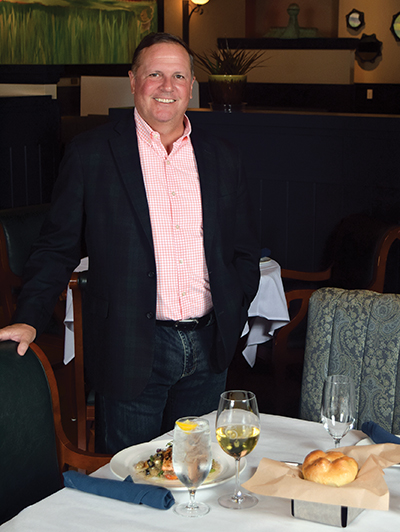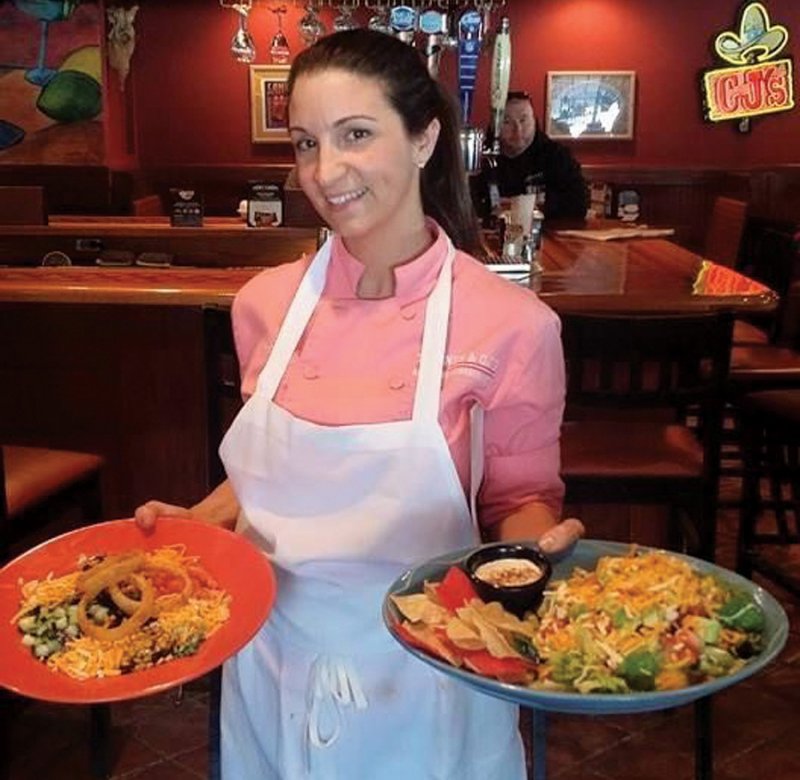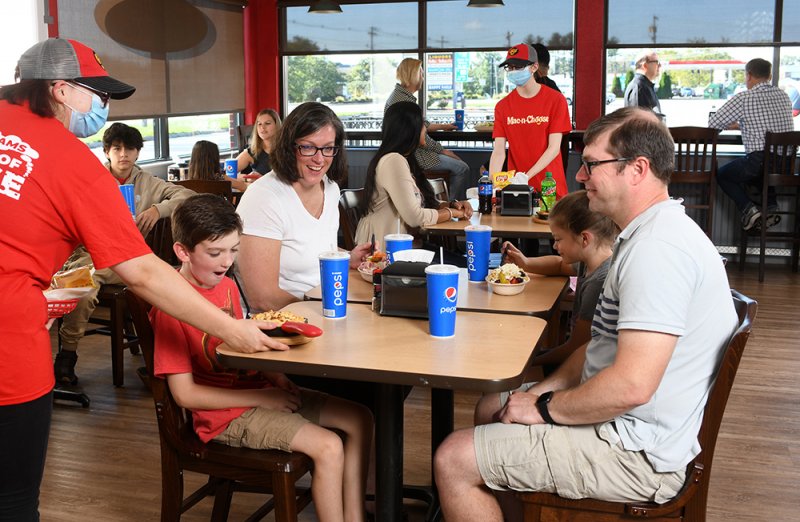 Tom Boucher (pictured) is a bit of an outlier in the restaurant business these days. The CEO and owner of Great NH Restaurants may be one of the few restaurateurs who sees a silver lining in the workforce crisis that’s reshaping the industry.
Tom Boucher (pictured) is a bit of an outlier in the restaurant business these days. The CEO and owner of Great NH Restaurants may be one of the few restaurateurs who sees a silver lining in the workforce crisis that’s reshaping the industry.
“The industry has expanded and exploded in recent years to the point where it became oversaturated,” he says. “You saw some close because of the pandemic; you will see more close because they can’t get employees. It will bring back down the number of restaurants so things will get a little more normalized. You’re not going to need as many workers because there won’t be as many restaurants. It’s an industry correction. It needed it.”
Boucher’s company operates widely recognized brands throughout the state, including T-Bones, CJ’s, Cactus Jack’s and Copper Door.
“Take the Manchester market alone,” he adds. “Our most challenging location, revenue-wise, is CJ’s Great West Grill in Manchester because there are just so many dining seats downtown. A Popeye’s opened on South Willow Street, and people say they aren’t a competitor but they are.”

Chef Nicole, executive chef for Great NH Restaurants, at CJ’s in Manchester. Courtesy photo.
The trend Boucher describes is well under way. An estimated 200 NH restaurants have closed since March of 2019, according to the NH Lodging and Restaurant Association (NHLRA), including seemingly well-established venues like The Striker (once the Dolphin Striker) in Portsmouth.
Using NH data from a national survey of 4,000 restaurants, the NHLRA reported in September that 91% of Granite State restaurants are understaffed and 79% are less profitable, with most reporting higher costs for food, rent and labor, amid declining customer traffic prior to this summer.
Customers are Back
The customers are returning though workers are not, putting even more pressure on the employees who remain. An unprecedented 892,000 hospitality workers walked off the job in August, according to the most recent Job Openings and Labor Turnover Survey from the U.S. Bureau of Labor Statistics.
That put the “quit rate” among restaurant workers at 6.8%, more than twice the national average of 2.9% for all jobs, which was itself a record.
And many are not coming back, at least not any time soon. According to a survey of 13,000 restaurant, bar and hotel workers released in July by Bloomberg, “More than half of U.S. hospitality workers wouldn’t go back to their old jobs and over a third aren’t even considering reentering the industry.… No pay increase or incentive would make these workers return to their previous workplace.”
The reasons most often cited: low wages, few benefits, physically demanding workplace, irregular hours and abusive bosses. Add to that a growing number of angry customers taking out their frustrations on a frazzled staff.
“We absolutely are seeing that,” says Boucher. “It is real and it is frustrating. These people are swearing at our staff, literally using language you wouldn’t even hear in a movie. I’ve had young women who’ve been called nasty words and broken down to tears. I’ve had to ban a handful of guests at various locations for verbally abusing our staff.” Most of these exchanges center around mask wearing, either for or against, says Boucher.
No One is Immune
Few if any restaurants are immune from the worker shortage. Boucher’s operation is among the most stable in terms of workforce, and he is short about 50 employees. “Ideally, we want to be at 800 employees and we are at 750.” That’s a shortfall of about 6%.
Non-tipped workers at Great NH Restaurants make between $15 and $25 an hour, according to Boucher, who says tipped employees make between $20 and $40 an hour.
Alex Ray, who owns The Common Man Family which includes multiple hospitality businesses, says staffing is 25% below pre-COVID levels. “I’d say we’re shorthanded in almost every restaurant,” he says, “but the severity has been minimized by efficiency.”
Large groups like the Common Man and Great NH Restaurants benefit from economies of scale and a core of longtime employees. Newer restaurants, particularly in the convenience and casual sector, face a different set of challenges.
Harry Cheema started his chain of restaurants, now known as Mac-n-Choose, in 2016 with a location in Portsmouth. Ten months later he opened a location in Tyngsboro, Mass., and in 2019, just before the pandemic hit, he opened another in Westford, Mass.
Before the pandemic, Cheema was paying $12 an hour but had to raise that to $13.50 and $14.50. Pay for salaried managers has gone up as much as 20% during the same time. Yet he is about 40% short of personnel needed, including managers.

Employees and guests at Mac-n-Choose. Courtesy photo.
Adapting to the New Reality
In addition to raising wages, restaurants have responded to the worker shortage by trying to keep conditions as stable as possible, offering career pathways and adapting their business model to the new reality.
Great NH Restaurants has reduced operating hours, closing dining rooms at 10 on weeknights and 11 on weekends, as opposed to closing at 12:30 a.m. across the board.
Cheema closed his Portsmouth location entirely. Common Man has made various adjustments, including shutting down the upstairs portion of the popular Concord location during some of the busiest hours.
“We did close some locations one day a week and changed some hours,” says Ray. “We don’t want to burn out the staff we have, so we’re fairly careful not to over-seat people.”
Referral, signing and retention bonuses are becoming more common, along with commitments to career advancement among the restaurants trying desperately to keep the employees they have.
But something fundamental has changed, according to Cheema, whose observation was echoed by other restaurant owners.
“If you hired someone, pre-pandemic, they would stay; retention was great,” he says. “Now they stay a week, maybe two or three weeks, and despite your best effort, they leave. They leave because of extra pay elsewhere; or they need to be home for something; or they need to drive their sister to and from school; or they don’t have day care anymore. Lifestyle issues people used to overcome now seem insurmountable.”
Permanent Transformation
Mike Somers, president and CEO of the NH Lodging and Restaurant Association, says the industry may emerge from this disruption permanently transformed. In addition to the smaller number of restaurants that Boucher alluded to, he sees other significant changes under way.
The wait for a table is likely to be longer, the service slower, the prices higher. In casual, convenience or fast-food locations, customers may be ordering from a kiosk. The increase in take-out and delivery service generated by the pandemic could be here to stay.
“The industry is going to have to find ways to adapt and modify to some degree, which is hard in our industry because it’s a people brand,” Somers says. “If you are going to fine dining, you are expecting someone to wait on you, and it’s really hard to automate that. But we are seeing in casual and quick service a lot more automation, driven by the fact that they can’t find enough staff to accomplish what they need to do.”

 Current Issue - April 2024
Current Issue - April 2024